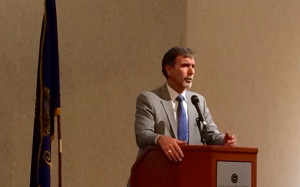Schools chief Sherri Ybarra is planning to overhaul or replace the state’s teacher evaluation model in the wake of reports revealing widespread data inaccuracy.
During an interview Tuesday, Ybarra said the Charlotte Danielson Framework for Teaching is being inappropriately applied as an accountability companion piece to the state’s teacher pay model.

“We have told folks over and over and over and over again that this is a problem,” Ybarra said.
“The right thing to do is to stop doing what’s wrong and change it.”
The state and most of its school districts use the Danielson model as a measure of teacher performance and a basis for evaluations.
In 2015, the Idaho Legislature partially tied hundreds of millions of dollars in taxpayers’ money to teacher evaluations through the career ladder salary law.
Ybarra announced steps to retool or replace the evaluation model less than three weeks after Idaho Education News used public records to uncover widespread errors and omissions contained in evaluation data maintained by the State Department of Education — which Ybarra heads as superintendent of public instruction.
For the second consecutive year, EdNews reported that administrators in multiple Idaho school districts erroneously reported to the state that all of their teachers received overall identical scores on their annual evaluations.
In addition to uncovering bogus reports of all teachers earning overall identical evaluation scores, EdNews found that administrators from multiple school districts entered their own data incorrectly or omitted data.
Next year, the stakes for evaluations and data accuracy are set to rise significantly, as a teacher’s ability to move up the career ladder and earn a raise will be tied to specific performance evaluation criteria.
But Ybarra may make major changes before the end of next school year. She has already identified the Denver-based education consulting firm of McRel International as a potential vendor to design a replacement evaluation system. In conjunction with a national consulting firm, Ybarra said she would appoint a local team of educators, administrators and stakeholders to provide suggestions.
“It is a hot-button issue,” Ybarra said. “We have known for a long time we have the wrong tool in place. So now lets focus on solutions.”
The new evaluation model would need to meet several criteria for Ybarra to sign off. She said any new plan would have to be tied to the career ladder salary law and to Danielson’s model. Additionally, the new model must incorporate a mentorship piece for beginning teachers. Finally, Ybarra acknowledged the new model would need some accountability provisions to satisfy the Legislature.
“Accountability is not synonymous with punishment,” Ybarra said. “The purpose of that is to make sure that we are doing the right thing and to make sure we have the right resources in place, and we’re recognizing we don’t.”
Ybarra is planning to make recommendations for changes to the Legislature in January, she said Tuesday.

Rob Winslow, executive director of the Idaho Association of School Administrators, said he had not yet heard of Ybarra’s plans to overhaul the system. School administrators are responsible for completing the annual teacher evaluations. However, Winslow said considering changes makes sense.
“Education is an area where there is always new research and always new input,” he said. “We want to get it right.”
Winslow said there is conflict and tension in the way Idaho deploys the Danielson model for evaluations and accountability. The model was originally developed as a teaching tool to help educators identify their strengths and weaknesses and develop strategies to improve. But when the Legislature partially tied proficiency in evaluations to the teacher pay model, Danielson’s model then became a tool that could be used to fire a teacher or prevent him or her from getting a raise.
“The model itself was never really built to do that,” Winslow said.
In Idaho, evaluations focus on everything from an educator’s instructional techniques to professional responsibilities, planning and preparation. Evaluations must also include classroom observations and a conference with the administrator.
Further complicating the evaluation system is that not all Idaho schools use Danielson the same way — or at all. Some districts award four different evaluation scores — “unsatisfactory,” “basic,” “proficient” and “distinguished.” But other districts, such as Boise, only use three scores and don’t award “distinguished” marks.
On top of that, some districts, including Bonneville, don’t use Danielson at all.
Bonneville has opted for the Jordan Performance Appraisal System.
During Tuesday’s interview, Ybarra insisted that administrators were not “purposely falsifying information” in teacher evaluation reports to the State Department of Education.
Last year, now-retired New Plymouth Superintendent Ryan Kerby said his district purposely awarded identical overall evaluation scores because “our school district, quite unanimously, did not figure the state needs to know all that individual teacher data.”
This year, superintendents from Kuna and Post Falls said they knowingly awarded identical overall evaluation scores in order to meet a state deadline.
“For some reason it was better to enter all (identical scores of “proficient”) and meet the timeline than wait until they could make the modifications to our business software in order to enter the correct data,” Post Falls Superintendent Jerry Keane wrote in a June 24 email to EdNews.
